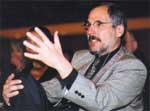Summer 2001
10 Tips on Award-Winning Civic Journalism
By Leonard Witt
Executive Director,
Civic Journalism Initiative
Minnesota Public Radio, St. Paul

These lessons were inspired by “The Guinea Pig Kids,” an MPR series that won an honorable mention in the 2001 Batten Awards for Excellence in Civic Journalism and a first-place award from the Society of Professional Journalists for public service.
Require total newsroom commitment. Top-notch projects rarely are produced on demand. Editors and reporters must want to do them and must feel ownership of the projects.
Weave elements together to form an inseparable whole. Too often, multimedia pieces are stitched together piecemeal throughout a project and then thought of as convergence. Better to integrate elements from the start and develop them so that they function as inseparable fabric.
Ask what should naturally grow from each project. Expedience and deadlines usually demand that we work from set formulas, but award-winning projects demand that we break out of the everyday mold. Each should have its own structure that grows naturally from the topic at hand.
Listen to people who normally aren’t heard. It’s important to go way out of our comfort zone and our homogenous newsrooms and listen to all voices.
Think multimedia. The Internet makes possible print, audio, and visual presentations and offers infinite possibilities. A project finished in the newsroom can grow better in time with public interaction. However, a single medium, when done extremely well, can compete in quality and effectiveness against any multimedia presentation.
Think longevity. The Internet gives stories a long, useful life. It used to be that most news was ephemeral. You heard it, read it, saw it today and it was gone. Now each story can be out there forever. Ask: How will this story play tomorrow, next week, next month or maybe even next year?
Think globally. Minnesota Public Radio’s “American RadioWorks” won the DuPont-Columbia Gold Baton Award for its series on Serb death squads attacking the ethnic Albanian village of Cuska. Written for an American radio audience, it was later translated into Serbian and will be translated into Albanian so people in Serbia and Albania can hear the story. Regionally, audiences are also diverse but some are so overlooked they might as well be in another country.
Think narrowcast as well as broadcast. Civic engagement, small online forums, public debates and other intimate, person-to-person connections can be crucial pieces of a larger effort.
Don’t worry about time and expense. This one will make the uninspired bean counters wince. If you do an award-winning story, no one asks what it cost or how long it took. They just want more. Save a dime and produce mediocre stuff and you are doomed.
Forget about the naysayers. Seek colleagues who want to innovate and have that creative spirit. They will like the extra reach that civic journalism, the Web and other vehicles will give their stories.
_________________________
(c) Leonard Witt, MPR, June 2001. Find the series at www.mpr.org.
